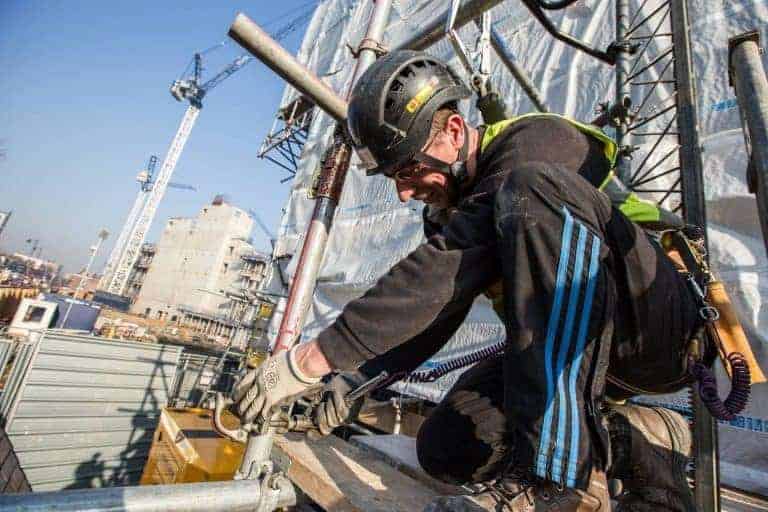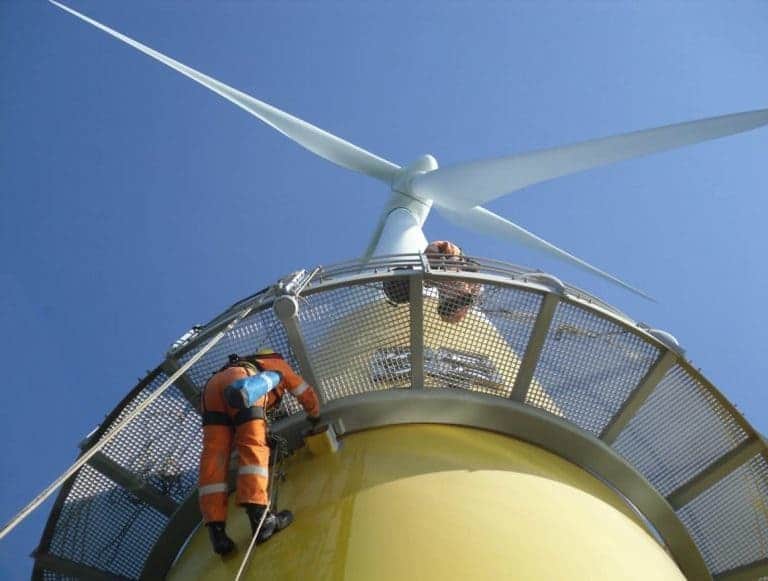 TRAD Midlands are working closely with Bovis Homes and Westleigh Homes on both projects which are located in Lichfield, Staffordshire. This expansion into New Build and Construction Sectors is perfectly complimented by the use of Plettac System Scaffold.
TRAD Midlands is part of the TRAD Group, which also comprises of TRAD Southern, TRAD Northern, TRAD Hire & Sales and TRAD Safety Systems. The TRAD Group operates from 18 locations throughout the UK, has an annual turnover in excess of £110million, and employs over 1,000 people.
TRAD have a nationwide coverage of system scaffold and currently hold over 19,000 tonnes, in addition to 66,000 tonnes of traditional tube, fitting and boards – no other UK scaffolding group has such capacity and level of equipment.
TRAD Midlands are working closely with Bovis Homes and Westleigh Homes on both projects which are located in Lichfield, Staffordshire. This expansion into New Build and Construction Sectors is perfectly complimented by the use of Plettac System Scaffold.
TRAD Midlands is part of the TRAD Group, which also comprises of TRAD Southern, TRAD Northern, TRAD Hire & Sales and TRAD Safety Systems. The TRAD Group operates from 18 locations throughout the UK, has an annual turnover in excess of £110million, and employs over 1,000 people.
TRAD have a nationwide coverage of system scaffold and currently hold over 19,000 tonnes, in addition to 66,000 tonnes of traditional tube, fitting and boards – no other UK scaffolding group has such capacity and level of equipment. TRAD Midlands secures its first Timber Frame New Build Projects
TRAD Midlands, formerly known as MTD, has recently secured two timber frame new build projects.
 TRAD Midlands are working closely with Bovis Homes and Westleigh Homes on both projects which are located in Lichfield, Staffordshire. This expansion into New Build and Construction Sectors is perfectly complimented by the use of Plettac System Scaffold.
TRAD Midlands is part of the TRAD Group, which also comprises of TRAD Southern, TRAD Northern, TRAD Hire & Sales and TRAD Safety Systems. The TRAD Group operates from 18 locations throughout the UK, has an annual turnover in excess of £110million, and employs over 1,000 people.
TRAD have a nationwide coverage of system scaffold and currently hold over 19,000 tonnes, in addition to 66,000 tonnes of traditional tube, fitting and boards – no other UK scaffolding group has such capacity and level of equipment.
TRAD Midlands are working closely with Bovis Homes and Westleigh Homes on both projects which are located in Lichfield, Staffordshire. This expansion into New Build and Construction Sectors is perfectly complimented by the use of Plettac System Scaffold.
TRAD Midlands is part of the TRAD Group, which also comprises of TRAD Southern, TRAD Northern, TRAD Hire & Sales and TRAD Safety Systems. The TRAD Group operates from 18 locations throughout the UK, has an annual turnover in excess of £110million, and employs over 1,000 people.
TRAD have a nationwide coverage of system scaffold and currently hold over 19,000 tonnes, in addition to 66,000 tonnes of traditional tube, fitting and boards – no other UK scaffolding group has such capacity and level of equipment.
 TRAD Midlands are working closely with Bovis Homes and Westleigh Homes on both projects which are located in Lichfield, Staffordshire. This expansion into New Build and Construction Sectors is perfectly complimented by the use of Plettac System Scaffold.
TRAD Midlands is part of the TRAD Group, which also comprises of TRAD Southern, TRAD Northern, TRAD Hire & Sales and TRAD Safety Systems. The TRAD Group operates from 18 locations throughout the UK, has an annual turnover in excess of £110million, and employs over 1,000 people.
TRAD have a nationwide coverage of system scaffold and currently hold over 19,000 tonnes, in addition to 66,000 tonnes of traditional tube, fitting and boards – no other UK scaffolding group has such capacity and level of equipment.
TRAD Midlands are working closely with Bovis Homes and Westleigh Homes on both projects which are located in Lichfield, Staffordshire. This expansion into New Build and Construction Sectors is perfectly complimented by the use of Plettac System Scaffold.
TRAD Midlands is part of the TRAD Group, which also comprises of TRAD Southern, TRAD Northern, TRAD Hire & Sales and TRAD Safety Systems. The TRAD Group operates from 18 locations throughout the UK, has an annual turnover in excess of £110million, and employs over 1,000 people.
TRAD have a nationwide coverage of system scaffold and currently hold over 19,000 tonnes, in addition to 66,000 tonnes of traditional tube, fitting and boards – no other UK scaffolding group has such capacity and level of equipment. Scaffold Inspectors Prosecuted After Roofers Fall
The HSE have prosecuted two scaffold Inspectors after a worker fell through a gap between the scaffolding and the building, resulting in serious injuries.
Greater Manchester Magistrates Court heard how on 26th March 2014, the 49-year old roofer was working on a re-roofing project. As he stepped down from the untiled roof onto a fixed scaffold, he fell through a gap between the working platform of the scaffolding and the building. He suffered fracture injuries to his spine and had to wear a back brace for eight weeks. The HSE say the scaffolding had been signed off as safe for use by Mr Stephen Harper and Mr Garry Arnold. The investigation by the HSE had revealed that they had not carried out the relevant inspections and had falsified the certificates to show that all was safe for use. Speaking after the hearing HSE Inspector Matt Greenly said:“Scaffold Inspectors are relied upon by workers and must be trusted. Falsely completing reports without carrying out a thorough inspection can lead to serious risks being missed and life changing accidents occurring.”Mr. Stephen Harper of Alkrington, Middleton and Mr. Garry Arnold of Crookes, Sheffield, pleaded guilty to breaching Section 7(a) of the Health and Safety at Work etc. Act 1974 and were each sentenced to 170 hours community service and ordered to pay £1,500 costs.
Claims of New Scaffolders Card Scheme Are Unfounded
Claims the Engineering Construction Industry Training Board (ECITB) and the Scaffolding Association are working to create a new card scheme are unfounded according to senior industry sources.
There have been reports the proposed ECITB breakaway scheme is a direct result of the CISRS project introduced back in July. This is a compulsory two day continuing professional development course (CPD), all scaffolders need to undertake in order to have their card renewed. Unite has been successful in ensuring workers covered by the National Agreement for Engineering Construction Industry and on other individual sites, will be fully paid while taking the two day course. Costs, travel and accommodation will be met by employers. Unite claims it was informed by the ECITB it was in the process of developing a new scaffolding card scheme. That the ECITB’s decision emerged as a result of pressure from several offshore fabric maintenance companies, supported by the Scaffolding Association and the Offshore Construction Association.
“The proposal to introduce a rogue scaffolding scheme is bad news for workers, “ says Unite national officer for construction Bernard McAulay.
“It will affect standards and create confusion on sites. With workers regularly moving between sites it is also likely to hit them in their pockets as they will be forced to purchase two different cards, to ensure they are able to accept job offers. In recent years there has been a great deal of effort in reducing the number of construction card schemes, in order to improve standards and to avoid confusion and it now appears the ECITB is prepared to chuck that good work out of the window to appease a few penny pinching employers.”
When pressed for a response, Chris Claydon, Chief Executive for the ECITB, told ScaffMag: “We have no plans to bring in a new scaffolding card scheme in the UK. The new programme, which would be entirely voluntary, would award scaffolders based overseas the International Competence in Engineering (ICE) card, in existence since 2013, and used widely overseas as a standardised indicator of competence.
Unite claims it was informed by the ECITB it was in the process of developing a new scaffolding card scheme. That the ECITB’s decision emerged as a result of pressure from several offshore fabric maintenance companies, supported by the Scaffolding Association and the Offshore Construction Association.
“The proposal to introduce a rogue scaffolding scheme is bad news for workers, “ says Unite national officer for construction Bernard McAulay.
“It will affect standards and create confusion on sites. With workers regularly moving between sites it is also likely to hit them in their pockets as they will be forced to purchase two different cards, to ensure they are able to accept job offers. In recent years there has been a great deal of effort in reducing the number of construction card schemes, in order to improve standards and to avoid confusion and it now appears the ECITB is prepared to chuck that good work out of the window to appease a few penny pinching employers.”
When pressed for a response, Chris Claydon, Chief Executive for the ECITB, told ScaffMag: “We have no plans to bring in a new scaffolding card scheme in the UK. The new programme, which would be entirely voluntary, would award scaffolders based overseas the International Competence in Engineering (ICE) card, in existence since 2013, and used widely overseas as a standardised indicator of competence.
 The ECITB is committed to ensuring training supports the highest standards of safety across engineering construction sites. We are currently in discussion with the Construction Industry Scaffolders Record Scheme (CISRS) regarding compatibility between the CISRS card and the new programme.”
Having spoken to the Scaffolding Association ScaffMag can confirm there is no firm basis for such a rogue scheme. They told us: “The Association is not working with the ECITB about a new scaffolders card scheme and we have not had any contact with anybody at ECITB.”
Mr Claydon backed this response up by adding: “The ECITB is the UK’s leading authority on engineering construction training and we work closely with industry to ensure the workforce has the highest level of skills needed to compete globally. We say again – we are currently developing a training, development and assessment programme for scaffolders working overseas in response to interest from international engineering companies. Separately, offshore fabric maintenance companies in the UK have expressed an interest in a common scheme supporting the development and assessment of offshore scaffolders against a relevant standard.”
It would seem the union has been miss-informed, and we can re-iterate no compulsory rogue card scheme is being planned.
The ECITB is committed to ensuring training supports the highest standards of safety across engineering construction sites. We are currently in discussion with the Construction Industry Scaffolders Record Scheme (CISRS) regarding compatibility between the CISRS card and the new programme.”
Having spoken to the Scaffolding Association ScaffMag can confirm there is no firm basis for such a rogue scheme. They told us: “The Association is not working with the ECITB about a new scaffolders card scheme and we have not had any contact with anybody at ECITB.”
Mr Claydon backed this response up by adding: “The ECITB is the UK’s leading authority on engineering construction training and we work closely with industry to ensure the workforce has the highest level of skills needed to compete globally. We say again – we are currently developing a training, development and assessment programme for scaffolders working overseas in response to interest from international engineering companies. Separately, offshore fabric maintenance companies in the UK have expressed an interest in a common scheme supporting the development and assessment of offshore scaffolders against a relevant standard.”
It would seem the union has been miss-informed, and we can re-iterate no compulsory rogue card scheme is being planned. CISRS International Training Continues To Spread And Strengthen
Safety and Access have announced that following the stringent CISRS audits this week both of the partnership ventures for international CISRS training in Korea have successfully passed their renewal audits.
 Safety and Access (S&A) have been offering scaffolding related training in Korea for around 5 years and the partnership with Safety & Access (Korea) has been one of the most successful in the scheme with around 3000 people receiving training in the the oil and gas industry.
Rick Statham Joint Managing Director of S&A said: “We are really pleased to report they the two centres in Geoje and Ulsan have passed the stringent audit criteria. Both of these locations are very important strategically in relation to the local shipyards. In addition to the successful training programme so far with Samsung Heavy Industries we are pleased to report that we have also secured a significant amount of government funding which we will be offering our clients to shortly.”
Following the accreditation visits several update meetings were arranged with local oil and gas representatives from Shell. Statoil and Chevron to report on the progress of the scheme so far and local availability.
S&A continue to grow their overseas business with training facilities in Nepal, Oman and South Korea along with the two UK centres in Nottingham and Immingham. There also plans for further domestic and international development in 2018.
Safety and Access (S&A) have been offering scaffolding related training in Korea for around 5 years and the partnership with Safety & Access (Korea) has been one of the most successful in the scheme with around 3000 people receiving training in the the oil and gas industry.
Rick Statham Joint Managing Director of S&A said: “We are really pleased to report they the two centres in Geoje and Ulsan have passed the stringent audit criteria. Both of these locations are very important strategically in relation to the local shipyards. In addition to the successful training programme so far with Samsung Heavy Industries we are pleased to report that we have also secured a significant amount of government funding which we will be offering our clients to shortly.”
Following the accreditation visits several update meetings were arranged with local oil and gas representatives from Shell. Statoil and Chevron to report on the progress of the scheme so far and local availability.
S&A continue to grow their overseas business with training facilities in Nepal, Oman and South Korea along with the two UK centres in Nottingham and Immingham. There also plans for further domestic and international development in 2018. Bilfinger Salamis Lands £1Million Repair Services Contract
Bilfinger Salamis UK has secured a £1million three-year coating repair services contract working on Norfolk’s Sheringham Shoal wind farm, operated by Statoil.
The deal will also create five new offshore positions, supporting further expansion of Bilfinger’s services in the Southern North Sea. The leading energy services provider will manage the project from its base at Great Yarmouth supplying surface preparation, coating application and coating inspection services through it’s specialist rope access teams. “We are delighted to be working with Statoil on this contract. Bilfinger has a strong reputation in the renewables sector, having supported the design and installation of a large number of the UK’s wind farms”, said Bilfinger Salamis UK Managing Director, Sandy Bonner. “The east of England is an important hub for servicing our clients in the wind operations and maintenance market, and this win allows us to further invest in expanding our resources and capability. Now that windfarm assets are ageing, it’s great to see that we are being recognised for adding value through our significant operations and maintenance experience and capability. We have more than 40 years’ experience in delivering inspection, repair and maintenance services to the offshore energy industry, and our in-depth understanding, skills and local resources mean we’re ideally placed to continue supporting the long-term operations and maintenance needs of the UK wind sector.” The Sheringham Shoal Offshore Wind Farm (SSWF) is located 10-15 nautical miles off the North Norfolk coast. The wind farm features 88 offshore wind turbine generators with a total installed capacity of 315 MW. These substations are in turn connected to an onshore substation at Salle, near Cawston, Norwich, which connects the power produced by the wind farm to the national grid.New Group Commercial Director For SCP
Former General Manager Ron Johnson has been appointed Group Commercial Director by Wolverhampton-based Scaffolding & Construction Products (SCP).
The UK’s leading supplier of Acrow props and general construction products has a £20million turnover, and sees the move as pivotal to their continued success. With more than 30 years experience in the construction sector, the company see him as the perfect choice for overseeing sales, marketing, research and development within their overall organisation. Ron will report directly to the Group Managing Director, Dale R Dale, who is delighted to have him on board. “Ron is a respected professional in the sectors that we operate in and we’re delighted that he’s joined our senior management team,” he said. “ “A key part of our future plans is to develop and expand our product range and help our customers improve performance both locally and in the export market. Ron will certainly help with this.” SCP is a member of the MSUK Group, including leading construction brands used widely in scaffolding, demolition, formwork, falsework and events sectors. Mr Johnson added: “Dale has created a powerful group with one of the strongest ranges of specialist products in the construction and events industry, both here in the UK and overseas. It’s a privilege to become a member of the senior team at SCP and MSUK and together we’re totally committed to delivering quality products that create safe and productive sites across the country.” MSUK Group is a major manufacturer and distributor of more than 1,000 products covering access and formwork equipment, scaffolding, groundworks and events. The Group acquired SCP in 2017 and in addition to the world famous Acrow Prop, it is the sole approved manufacturer of the innovative Klawz scaffold fitting, ScottiClip, Tamer and Safelinx scaffold board retaining systems.Rilmac Scaffolding Up For Business Award
Rilmac Scaffolding have been announced as finalists in the prestigious Midlands Family Business of the Year Awards.
The awards which are open to family businesses from across the whole of the Midlands have a stringent selection process, and the team from Rilmac Scaffolding now face an interview process before the final announcement at a black tie event in Derby on 9th November. Rilmac Scaffolding have been shortlisted for the Fastest Growing Family Business Award after a fantastic year which has seen the company work as a key part of the DNRC Project near Loughborough, branch out in to the road and rail infrastructure market, and continue nationwide expansion. Des Booth, Managing Director of Rilmac Scaffolding Ltd. said “Well done, it is great to see the team recognised for all their hard work over the last four to five years.” The growth of Rilmac Scaffolding in the Midlands has been driven from their headquarters in Lincoln and their premises in Northampton. Working nationwide on projects with leading contractors and developers they also have offices in London and Huddersfield allowing them to cover the whole of the UK. Meanwhile The Rilmac Group of Companies as a whole has also been shortlisted for the Family Business of the Year 2017. Everyone across the group are proud and honoured to be finalists in this year’s awards.Avontus Case Study: Niles Plant Services LLC
The Company
Based in Bay City, Michigan, Niles Plant Services supplies scaffolding and related services to clients throughout the United States. The family-owned business focuses on customers in the chemical, automotive, manufacturing, industrial and utility sectors, managing around 100 scaffold builders at a time. Founded in 2013, the firm is building on the family’s nearly 50 years in the painting, blasting and coating business.
The Challenge
When Niles Plant Services got off the ground, project manager Kirk Stevens sketched scaffold designs and drew up materials lists by hand. As demand for the company’s services grew, several colleagues were pulled in to help produce drawings.
Stevens and his supervisors soon realized that manual drafting was slowing the company down. Drawings were taking hours, especially when designs were complex or included multiple structures. “Sometimes I could not respond to my customers as quickly as they needed,” Stevens says. It took even more time to produce material counts. That put a limit on how many jobs the company could bid for and carry out.
Drawing by hand could also cause hold-ups in the field. “If you have 10 different people build a scaffold, you’ll get a different result 80% of the time. The builders are forced to interrupt designs and sometimes change parts, and that can definitely cause delays in production,” Stevens says.
Company leaders realized they needed to incorporate technology to improve speed and quality. “We started looking ahead at what the trends are going to be and what’s going to set us apart from other companies. We wanted to take the next step and go further for customers, and we wanted to become more efficient and better at what we do,” says Mike O’Keefe, the firm’s vice president of scaffold operations.
O’Keefe considered developing software internally, but quickly decided that wouldn’t be cost-efficient. He reviewed several software options before settling on Avontus’ Scaffold Designer, in part because it was easy to use and had multiple scaffolding manufacturers preloaded. “I didn’t really see any other software that was comparable, to be perfectly honest,” he says. “We decided that purchasing Avontus’ Scaffold Designer software was the right move for us.”
The Solution
Niles Plant Services began using Scaffold Designer in December 2015. The company immediately saw drastic improvements in efficiency. “Creating drawings and material lists was easily 50% quicker if not more,” Stevens says. “With Scaffold Designer, you can add everything you need with one click.”
That meant colleagues who had previously helped with drawings could focus elsewhere. And the firm could take business to the next level. “Scaffold Designer allowed us to increase our bid volume, our capacity and our ability to get more work,” O’Keefe says.
Scaffold Designer is also helping the firm win clients and increase customer satisfaction. When customers receive a quote, they now get a drawing as well. “Customers want to know we have the ability to access certain areas and get around obstacles. This gives us the opportunity to show them before they even ask,” O’Keefe says.
 Drawings produced in Scaffold Designer, including a 3D view, also help project managers clarify exactly what they want built in the field. “When we give a copy of the drawing to the scaffold team, it allows them to take some of the guesswork and redesign out of it,” O’Keefe says.
Communication got even smoother starting in March 2017, when Niles Plant Services began using Scaffold VR, a new virtual reality extension for Scaffold Designer. Company leaders and operations managers can virtually walk through a design from all angles before it’s built. “Viewing models in Scaffold VR helps identify clearance issues, distance from walls and other issues of concern. It puts it in perspective in a way that’s challenging for people in print,” O’Keefe says.
Drawings produced in Scaffold Designer, including a 3D view, also help project managers clarify exactly what they want built in the field. “When we give a copy of the drawing to the scaffold team, it allows them to take some of the guesswork and redesign out of it,” O’Keefe says.
Communication got even smoother starting in March 2017, when Niles Plant Services began using Scaffold VR, a new virtual reality extension for Scaffold Designer. Company leaders and operations managers can virtually walk through a design from all angles before it’s built. “Viewing models in Scaffold VR helps identify clearance issues, distance from walls and other issues of concern. It puts it in perspective in a way that’s challenging for people in print,” O’Keefe says.
 The firm is also using Scaffold VR to show designs to clients. “For people who aren’t sure how you’re approaching a project or how it’s going to function in real time, being able to walk them through a virtual build is fun and gives them the opportunity to see what it’s going to look like before it’s built,” O’Keefe says.
The cutting-edge tool is also helping Niles Plant Services win sales. “Models created in Scaffold Designer and Scaffold VR show potential customers that we’re taking the next step and looking ahead to consider all pitfalls and possibilities,” O’Keefe says. “Avontus’ Scaffold VR is one more way to show customers that we’re on top of our game and above the rest.”
The firm is also using Scaffold VR to show designs to clients. “For people who aren’t sure how you’re approaching a project or how it’s going to function in real time, being able to walk them through a virtual build is fun and gives them the opportunity to see what it’s going to look like before it’s built,” O’Keefe says.
The cutting-edge tool is also helping Niles Plant Services win sales. “Models created in Scaffold Designer and Scaffold VR show potential customers that we’re taking the next step and looking ahead to consider all pitfalls and possibilities,” O’Keefe says. “Avontus’ Scaffold VR is one more way to show customers that we’re on top of our game and above the rest.”
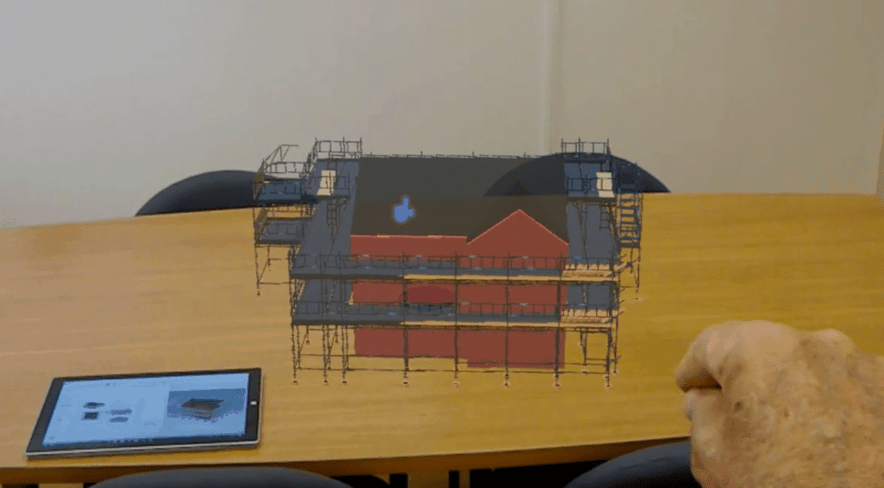 Drawings produced in Scaffold Designer, including a 3D view, also help project managers clarify exactly what they want built in the field. “When we give a copy of the drawing to the scaffold team, it allows them to take some of the guesswork and redesign out of it,” O’Keefe says.
Communication got even smoother starting in March 2017, when Niles Plant Services began using Scaffold VR, a new virtual reality extension for Scaffold Designer. Company leaders and operations managers can virtually walk through a design from all angles before it’s built. “Viewing models in Scaffold VR helps identify clearance issues, distance from walls and other issues of concern. It puts it in perspective in a way that’s challenging for people in print,” O’Keefe says.
Drawings produced in Scaffold Designer, including a 3D view, also help project managers clarify exactly what they want built in the field. “When we give a copy of the drawing to the scaffold team, it allows them to take some of the guesswork and redesign out of it,” O’Keefe says.
Communication got even smoother starting in March 2017, when Niles Plant Services began using Scaffold VR, a new virtual reality extension for Scaffold Designer. Company leaders and operations managers can virtually walk through a design from all angles before it’s built. “Viewing models in Scaffold VR helps identify clearance issues, distance from walls and other issues of concern. It puts it in perspective in a way that’s challenging for people in print,” O’Keefe says.
 The firm is also using Scaffold VR to show designs to clients. “For people who aren’t sure how you’re approaching a project or how it’s going to function in real time, being able to walk them through a virtual build is fun and gives them the opportunity to see what it’s going to look like before it’s built,” O’Keefe says.
The cutting-edge tool is also helping Niles Plant Services win sales. “Models created in Scaffold Designer and Scaffold VR show potential customers that we’re taking the next step and looking ahead to consider all pitfalls and possibilities,” O’Keefe says. “Avontus’ Scaffold VR is one more way to show customers that we’re on top of our game and above the rest.”
The firm is also using Scaffold VR to show designs to clients. “For people who aren’t sure how you’re approaching a project or how it’s going to function in real time, being able to walk them through a virtual build is fun and gives them the opportunity to see what it’s going to look like before it’s built,” O’Keefe says.
The cutting-edge tool is also helping Niles Plant Services win sales. “Models created in Scaffold Designer and Scaffold VR show potential customers that we’re taking the next step and looking ahead to consider all pitfalls and possibilities,” O’Keefe says. “Avontus’ Scaffold VR is one more way to show customers that we’re on top of our game and above the rest.” Palmers Provide Innovative Scaffolding Solutions at Carlisle Rail Station
Scaffolding contractor Palmers Scaffolding UK Ltd are providing innovative scaffolding, public protection decks and access solutions for Galliford Try at the historic Carlisle Railway Station in Cumbria.
The intricate, in-house designed, 1,400-tonne scaffolding temporary works began at the Grade II listed building (which forms part of the Carlisle conservation zone) in January 2016 – as leading principal contractor Galliford Try aim to refurbish the train-shed roof, maintain the station and extend the property’s life by at least 30 years.
Large sections of the roof had been damaged partly by seagulls, which had broken many of the historic glass panels dropping stones. These panels are being replaced with safer Ethlene tetra fluoro ethylene (ETFA) options, accessed via the Palmers scaffolding.
The in-house designed Palmers scaffold is required to provide access and protection decks and is 47m in span and 160m long, spanning 13 roof bays and the platforms below to create a working level 9m above the ground level. It has been created by more than 20 advanced scaffolders, with additional support by Palmers management and supervisors. And the modern access solutions will enable the historic roof to be refurbished, including glass removal and reconstruction together with steel repairs where necessary.
 The state-of-the-art scaffolding supplied by Palmers is based on modular access and protection scaffold systems bespoke to the firm. The key component within the scaffold structure is ‘Palmers 1350 Bridge Panel System’ – which incorporates bracing and end panels, so the components can be used in either beam structures to span the railway or support columns to provide bases for the protection decks.
The use of the Palmers bridging panel system is a key factor in allowing Palmers to design a scaffolding structure which can span the railway lines. This system crucially allows the works to carry on without interfering with the running of the railway – as well as protecting the commuting passengers and railway staff who operate within the station 365 days a year, where there are in excess of one million passenger movements through the station each year.
The state-of-the-art scaffolding supplied by Palmers is based on modular access and protection scaffold systems bespoke to the firm. The key component within the scaffold structure is ‘Palmers 1350 Bridge Panel System’ – which incorporates bracing and end panels, so the components can be used in either beam structures to span the railway or support columns to provide bases for the protection decks.
The use of the Palmers bridging panel system is a key factor in allowing Palmers to design a scaffolding structure which can span the railway lines. This system crucially allows the works to carry on without interfering with the running of the railway – as well as protecting the commuting passengers and railway staff who operate within the station 365 days a year, where there are in excess of one million passenger movements through the station each year.
 In addition, all scaffolding works over the tracks’ electrified OLE System have to be erected during night-time possessions, which restrict the working time to a short five hour window overnight, from circa midnight.
Palmers design and construction team developed a scaffolding structure and solution that could be partially erected away from the main rail line to help minimise the risk of working at height and improve productivity by carrying out works away from the railway environment outside the short night time possession windows.
In addition, all scaffolding works over the tracks’ electrified OLE System have to be erected during night-time possessions, which restrict the working time to a short five hour window overnight, from circa midnight.
Palmers design and construction team developed a scaffolding structure and solution that could be partially erected away from the main rail line to help minimise the risk of working at height and improve productivity by carrying out works away from the railway environment outside the short night time possession windows.
 Palmers Scaffolding UK Ltd Director, Lindsay Harle said: “Palmers have been the scaffolding contractor of choice on some of the most significant railway station refurbishments in the UK – from St Pancras in London to Waverley Station in Edinburgh. And we are delighted to have been given the opportunity to support Galliford Try in the contract at Carlisle and look forward to a successful completion of this contract and working together successfully on many more projects thereafter.”
Donald Morrison, MD comments: “We at Palmers are proud that our people continue to make the difference. This is evident in the scaffolding works we have delivered safely during the erection phase at Carlisle, whilst minimising the Working at Height, through utilising the ‘Palmers 1350 Bridge Panel System.’ We look forward to a safe successful completion of the works at Carlisle.”
Palmers Scaffolding UK Ltd Director, Lindsay Harle said: “Palmers have been the scaffolding contractor of choice on some of the most significant railway station refurbishments in the UK – from St Pancras in London to Waverley Station in Edinburgh. And we are delighted to have been given the opportunity to support Galliford Try in the contract at Carlisle and look forward to a successful completion of this contract and working together successfully on many more projects thereafter.”
Donald Morrison, MD comments: “We at Palmers are proud that our people continue to make the difference. This is evident in the scaffolding works we have delivered safely during the erection phase at Carlisle, whilst minimising the Working at Height, through utilising the ‘Palmers 1350 Bridge Panel System.’ We look forward to a safe successful completion of the works at Carlisle.”
 The state-of-the-art scaffolding supplied by Palmers is based on modular access and protection scaffold systems bespoke to the firm. The key component within the scaffold structure is ‘Palmers 1350 Bridge Panel System’ – which incorporates bracing and end panels, so the components can be used in either beam structures to span the railway or support columns to provide bases for the protection decks.
The use of the Palmers bridging panel system is a key factor in allowing Palmers to design a scaffolding structure which can span the railway lines. This system crucially allows the works to carry on without interfering with the running of the railway – as well as protecting the commuting passengers and railway staff who operate within the station 365 days a year, where there are in excess of one million passenger movements through the station each year.
The state-of-the-art scaffolding supplied by Palmers is based on modular access and protection scaffold systems bespoke to the firm. The key component within the scaffold structure is ‘Palmers 1350 Bridge Panel System’ – which incorporates bracing and end panels, so the components can be used in either beam structures to span the railway or support columns to provide bases for the protection decks.
The use of the Palmers bridging panel system is a key factor in allowing Palmers to design a scaffolding structure which can span the railway lines. This system crucially allows the works to carry on without interfering with the running of the railway – as well as protecting the commuting passengers and railway staff who operate within the station 365 days a year, where there are in excess of one million passenger movements through the station each year.
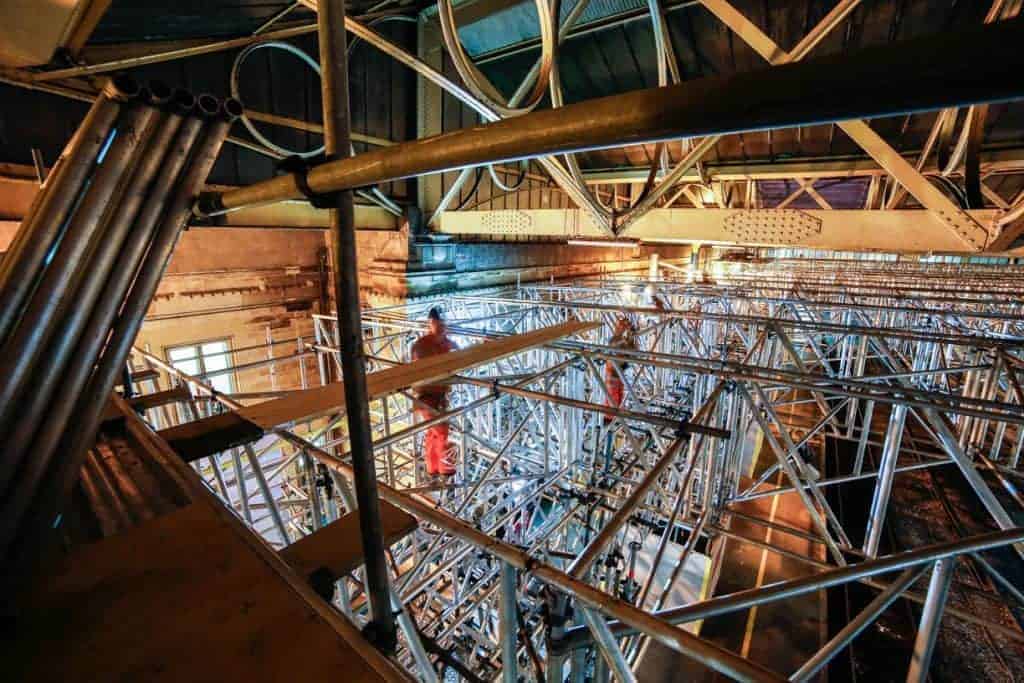 In addition, all scaffolding works over the tracks’ electrified OLE System have to be erected during night-time possessions, which restrict the working time to a short five hour window overnight, from circa midnight.
Palmers design and construction team developed a scaffolding structure and solution that could be partially erected away from the main rail line to help minimise the risk of working at height and improve productivity by carrying out works away from the railway environment outside the short night time possession windows.
In addition, all scaffolding works over the tracks’ electrified OLE System have to be erected during night-time possessions, which restrict the working time to a short five hour window overnight, from circa midnight.
Palmers design and construction team developed a scaffolding structure and solution that could be partially erected away from the main rail line to help minimise the risk of working at height and improve productivity by carrying out works away from the railway environment outside the short night time possession windows.
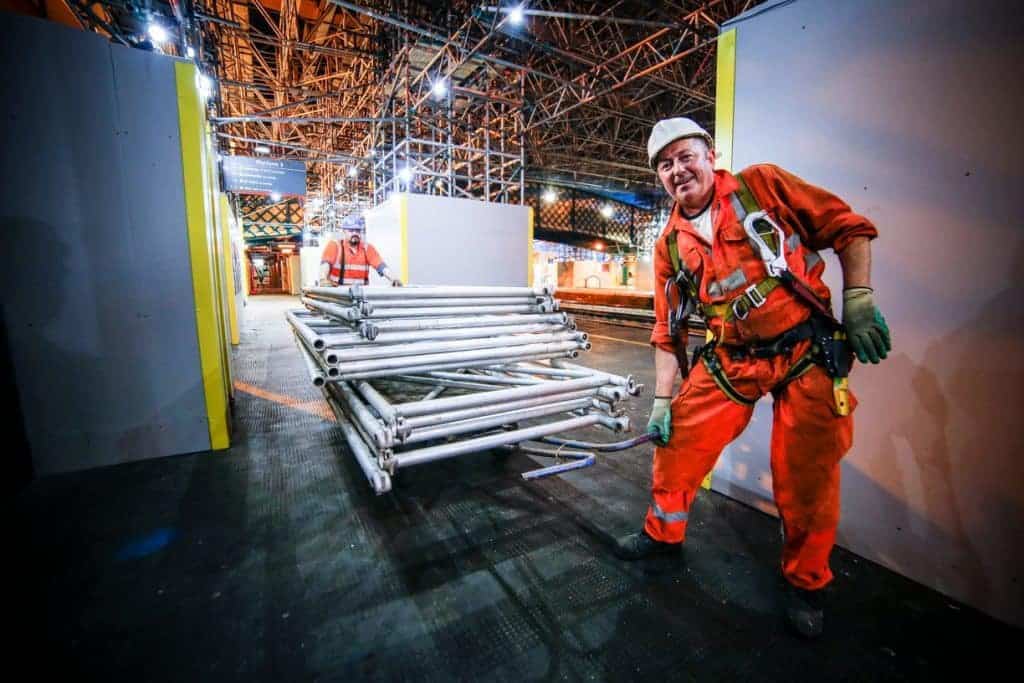 Palmers Scaffolding UK Ltd Director, Lindsay Harle said: “Palmers have been the scaffolding contractor of choice on some of the most significant railway station refurbishments in the UK – from St Pancras in London to Waverley Station in Edinburgh. And we are delighted to have been given the opportunity to support Galliford Try in the contract at Carlisle and look forward to a successful completion of this contract and working together successfully on many more projects thereafter.”
Donald Morrison, MD comments: “We at Palmers are proud that our people continue to make the difference. This is evident in the scaffolding works we have delivered safely during the erection phase at Carlisle, whilst minimising the Working at Height, through utilising the ‘Palmers 1350 Bridge Panel System.’ We look forward to a safe successful completion of the works at Carlisle.”
Palmers Scaffolding UK Ltd Director, Lindsay Harle said: “Palmers have been the scaffolding contractor of choice on some of the most significant railway station refurbishments in the UK – from St Pancras in London to Waverley Station in Edinburgh. And we are delighted to have been given the opportunity to support Galliford Try in the contract at Carlisle and look forward to a successful completion of this contract and working together successfully on many more projects thereafter.”
Donald Morrison, MD comments: “We at Palmers are proud that our people continue to make the difference. This is evident in the scaffolding works we have delivered safely during the erection phase at Carlisle, whilst minimising the Working at Height, through utilising the ‘Palmers 1350 Bridge Panel System.’ We look forward to a safe successful completion of the works at Carlisle.” Mercer Scaffolding aims high with new Mercedes-Benz trucks
Mercer Scaffolding has continued to raise its ambitions by investing in three state of the art Mercedes-Benz trucks.
They include a 15-tonne Atego 1518, and two 26-tonne Arocs 2530 models with factory-fitted four-man benches behind the two front seats. This enables each to carry a driver and a crew of five scaffolders in safety and comfort. These new trucks are fitted with specialist dropside flat-bed bodies, used to carry scaffolding equipment such as tubes, boards and fittings. All three vehicles have Classic-space cabs – L-cab versions for the two Arocs, an S-Cab for the Atego, finished in bright orange. These feature the Mercer logo alongside that of Help for Heroes – the operator is an enthusiastic backer of the charity, supporting servicemen and women injured in the line of duty. As a family company they are based at Longfield in Kent, overseeing ongoing projects in both London and the South-East. The firm takes pride in offering its clients competitively priced, ‘all-in-one’ scaffolding solutions. Solid in construction the impressive Mercedes-Benz Arocs range of rigid trucks from 18-32 tonnes GVW and tractor units, are purpose-designed for construction-related applications. An advanced Atego, flies the flag for the three-pointed star in the 6.5-16 tonnes GVW segment. A popular choice for operators in the construction and associated sectors, most are used for light- and medium-duty distribution work. As a forward thinking business Mercer has introduced new management systems and procedures, as well setting up its own transport operation to service larger projects. It achieved Bronze accreditation from the Fleet Operator Recognition Scheme (FORS) last year, and sees the new vehicles as vital to securing Silver status towards the end of 2017.


